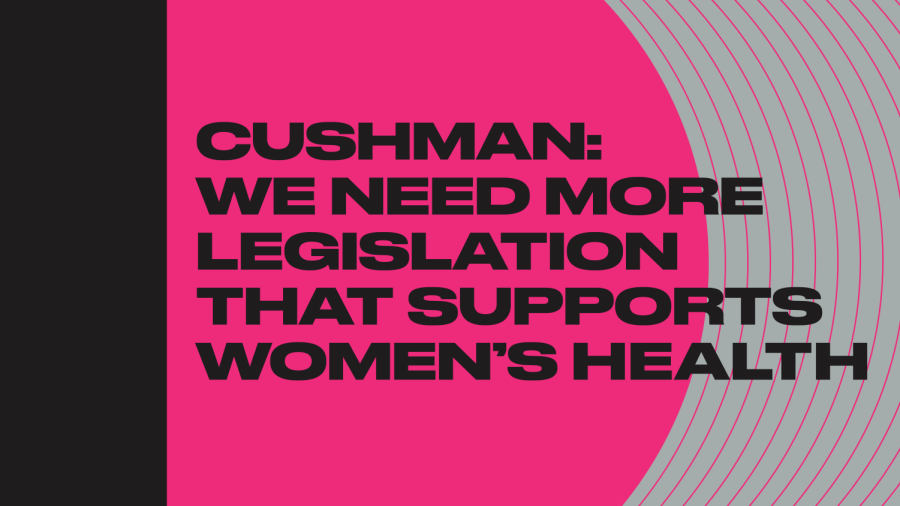Cushman: We Need More Legislation that Supports Women’s Health
(Graphic by Sydney Stam | The Daily Utah Chronicle)
March 2, 2022
This legislative session, Sen. Wayne Harper and Rep. Cheryl Acton sponsored Senate Bill 63. The bill aims to provide relief for people who lose a child to miscarriage or stillbirth by guaranteeing at least 3 work days of paid bereavement. If passed, Utahns who experience miscarriage and stillbirth won’t need to use vacation or sick days to stay home, grieve and let their bodies recover. This bill takes into account the health needs of women, unlike many current Utah laws. We need to celebrate victories in women’s health in Utah to show our legislature that it’s a constituent priority.
Miscarriage in Utah
Miscarriage and stillbirth are common for people who experience pregnancy. Statistics show that one in 10 women will experience a miscarriage in their life. 23 million miscarriages happen every year, meaning 15% of all pregnancies end in miscarriage. We also know that more babies die from stillbirth than sudden infant deaths (SIDs) and prematurity combined. These issues are particularly relevant to Utah because our poor air quality is linked to increased rates of miscarriage. Utah women have also started families later, increasing the risk of stillbirth.
However, despite the commonality of miscarriage and stillbirth, our society often minimizes the grief that comes with those fetal deaths. Researchers looking into miscarriage have found that we lack support for women and couples who experience this loss, with grieving potential parents often told to simply “try again.” This fits into a broader trend of ignoring women’s health issues in both medicine and legislation.
Disregard for Women’s Health
The medical field has a long history of ignoring the needs of women. Historically, the medical field has excluded women from research. Even today, a lot of research fails to consider gender as an important aspect of treatment. This gender gap also exists in treatment itself. One study found that women with severe stomach pain waited, on average, 16 minutes longer than men with the same symptom for treatment in the emergency room.
Looking at legislation, we once again see a gender gap in healthcare. The structure of laws surrounding healthcare and specifically reproductive care actively hurts women. When Congress tried to replace the ACA during the Trump administration, the legislation they drafted would have damaged the resources for female care.
Many states, too, have implemented restrictive reproductive care regulations that hurt women’s ability to receive good treatment. For instance, Alabama’s restrictive abortion and reproductive care laws exacerbate health concerns for poor women in their state.
Again, women’s health needs are particularly relevant in Utah because our state has repeatedly introduced or passed legislation that directly harms women’s health. Utah has been graded with an F- for reproductive services and rights. In 2010, our legislature considered a bill that would have criminalized abortion in a way that women who miscarried due to reckless behavior could have been charged with murder. In 2019, a bill that would have banned abortion after 18 weeks made significant headway in the legislature before failing. In 2021, Utah rejected a bill that would have added consent and sexual violence definitions to sex-ed requirements.
Supporting Utah Women
These incidents shows that Utah continually introduces legislation that could hurt women’s health, and ignores legislation that could help women. As Daily Utah Chronicle writer Aya Hibben said, “By restricting birth control access, limiting healthcare support, and allowing inadequate sex-ed to continue,” Utah only hurts the women who live here. Miscarriage and stillbirth represents one facet of women’s physical and mental health that too often gets little to no consideration in our state. S.B. 63 has the potential to change that.
The bill is the first of its kind in the United States, with Sen. Harper getting the idea from legislation in New Zealand. Giving people who experience miscarriage and stillbirth more resources can help us recognize the impact of those experiences. It acknowledges the importance of providing better physical and mental health resources to women in our state.
We need to recognize Utah’s flaws in dealing with women’s health issues, but we also need to celebrate lawmakers who find unique ways to make women’s health a priority. We need to show them that women’s health matters to us and that we want to see more legislation that supports women in our state.
Many Utah women have experienced and will continue to experience miscarriage and stillbirth. We’re a state that talks a lot about supporting families. We can’t do that without supporting women, an area in which our state and legislature often fails. S.B. 63 takes a step in the right direction towards taking women’s health seriously.









